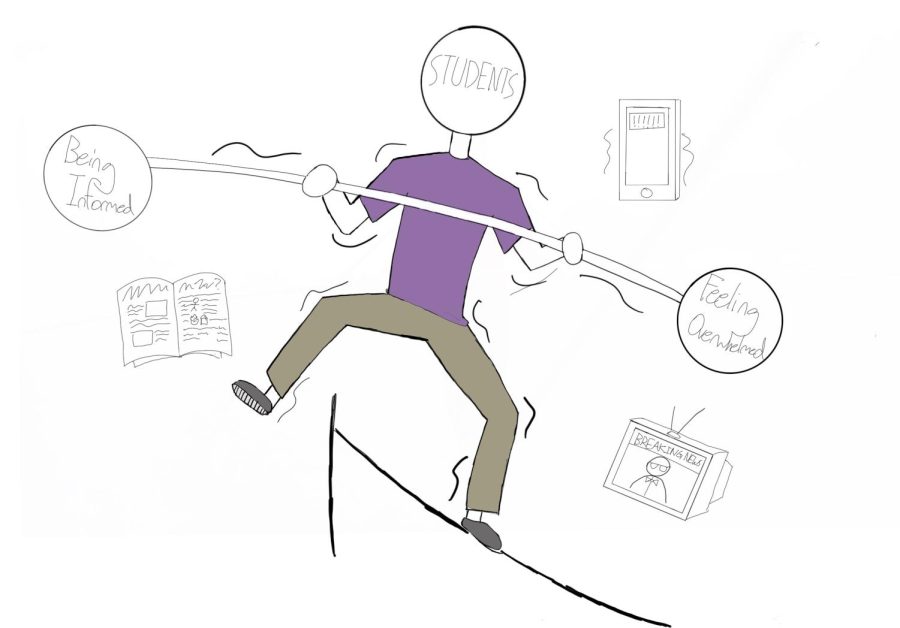When the News Gets Overwhelming, It’s Okay to Take a Break
While breaking news may grip you with fear of catastrophic thoughts that leads to endless checking of news, it is important to remind ourselves that news coverage is purposefully written in a more tense way at times. “You have to understand that what you’re consuming is a product that’s sold by a company that has an agenda,” senior Adam Mabsout said. “And that agenda does not align with your best interest, so you have to take that into account whenever you consume news.”
You know it when it happens. The sensation of receiving a barrage of alerts and texts following yet another overwhelmingly tragic news event has become cemented in the public consciousness. Particularly since the onset of the pandemic, such momentous issues seem to become increasingly prevalent, ranging wildfires to insurrections on democracy.
While it may seem merely perceptual, there is truth to this notion that the occurrence of such events has become more frequent, according to BBC News.
So if we are doomed to live with this reality for the foreseeable future, what can we do about it on a personal level?
The answer may seem rudimentary, but nonetheless effective: take a break from the news.
“I do think the news has been getting more overwhelming recently,” social studies teacher Daniel Hunter said. “It seems that there’s just one crisis after the next that captures the public’s attention and sort of drives people into a moral panic for significant periods of time. And it doesn’t really seem like there’s any break in between these various moral panics that the media moves us to and from.”
News today manifests in different forms that disseminate more rapidly than ever, like a simple scroll down your social media feed or push notifications from your lock screen. Such a rapid influx of information can cause “headline stress disorder,” a term coined by psychologist Steven Stosny to describe the strong emotional response people have from continual news alerts.
According to a study published in the British Journal of Psychology, “after being exposed to negative news, positive effect decreased, whereas negative affect, sadness, worries and anxiety increased. Other studies have found indirect effects on psychological distress and negative affect through an increase in stress levels and irrational beliefs”
The awareness that breaking news can rapidly evolve puts our bodies into a state of high alert. Though researchers are unable to point to evidence that negative news onsets new health conditions, such a state of mind amplifies adverse reactions like anxiety or depression.
“I find that balance is to not overconsume,” senior Adam Mabsout said. “If you hear about one event, you don’t have to read multiple articles or watch multiple videos about it. Also, understand that just because you’re learning about these events doesn’t mean that it has to affect you or that you need to internalize everything that you’re being told.”
Deleting news and social media apps for a couple days may be the most practical method to limit subconscious news-checking and doom-scrolling.
However, this is not to say that avoiding news is the solution; balance is key. Choosing a couple days of the week or specific times during the day to check the news can allow us to fully synthesize the information in an emotionally-regulated way.
“I think that in democracy or a representative republic like we have, there is a sort of an expectation that people stay up to date on what’s going on, so I suppose maybe that there is a stigma,” Hunter said. “But I don’t think that there’s anything wrong with people being more interested in what pertains to them personally.”
Your donation will support the student journalists of Portola High School. Your contribution will allow us to purchase equipment and cover our annual website hosting costs.

Grace Baek is the assistant Sports Editor for her second and final year on the Pilot. She is looking forward to getting to know the new staff members and...

Tyler Kim is an Editor-in-Chief for his third and final year writing for the Portola Pilot. Besides the production's monthly spreadsheet, you'll be sure...





